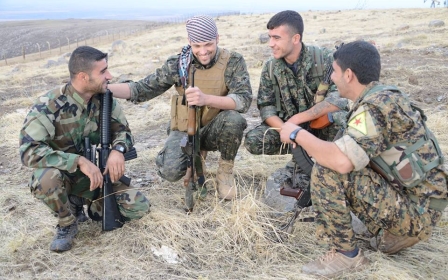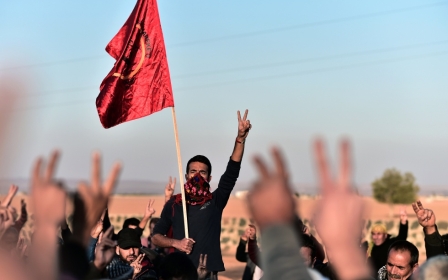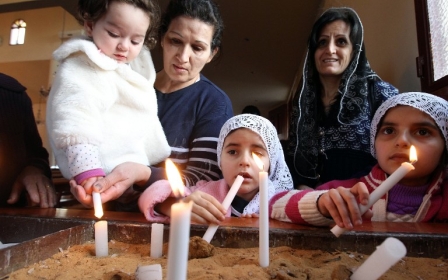Kurdish fighters take strategic town from IS in northern Syria

The People’s Protection Units (YPG) have liberated a strategic stronghold in Syria from the Islamic State (IS), further threatening the militant group’s links to the Iraqi border.
According to spokespeople from the Kurdish Democratic Union Party (PYD) – the YPG’s political wing – the group liberated Tal Hamis and the surrounding areas at the request of residents who “wanted to get rid of these terrorists and mercenaries.”
The Syrian Observatory for Human Rights (SOHR) said that IS “retreated without much resistance after Kurdish forces, backed by Arab fighters, returned to Tal Hamis,” a town that SOHR director Rami Abdel Rahman described as “one of the most important strongholds” of IS in the region.
According to the Kurdish Question website, quoting source in the YPG, the victory at Tal Hamis opened up the possibility of joining together the canton of Kobane – liberated by the group last month – with the canton of Jazirah to its East.
“This is being viewed as an important victory because Til Hemis was the headquarters of important ISIS attacks in the region,” it said.
“This victory has also blocked ISIS's path to the Sinjar direction and debilitates their capacity to move around the Jazaa, Tal Kocer and Qamislo delta.”
Since the beginning of the Syrian civil war, radical Kurdish groups began taking control of areas in the north of the country – known as Syrian Kurdistan or Rojava – and restructuring them into cantons based on local community control.
The Kurdish advance comes after days of fighting in which YPG forces have taken some 103 villages and hamlets.
Since the clashes began last Saturday, at least 175 IS fighters have been killed by the Kurds and in airstrikes by a US-led coalition.
Additionally, 30 fighters from the YPG and Arab units fighting alongside them have been killed. Among the dead was an Australian, the first Westerner to die in a Kurdish unit in Syria.
The Pentagon said the coalition had carried out several airstrikes in Hasakeh province on Thursday, including three near Tal Hamis.
The fighting came as Kurdish forces continued to battle IS after an offensive elsewhere in the province in which the militants kidnapped at least 220 Assyrian Christians.
Mass exodus
The offensive, during which IS also seized 10 villages, has prompted a mass exodus of an estimated 5,000 people to the cities of Qamishli and Hasakeh.
Jean Tolo, an official with the Assyrian Organisation for Relief and Development in Qamishli, said the pace of arrivals had slowed by Friday.
"We are offering the displaced food and everything they need," he told AFP by telephone.
"There are doctors working for free ready to deal with any emergency," he added.
Assyrians number about 30,000 among Syria's 1.2 million Christians and mostly live along the Khabur River in Hasakeh.
More than 210,000 people have been killed in Syria since the conflict began in March 2011.
Meanwhile, an official in Ankara said Turkey and the United States will begin preparing moderate Syrian rebels for combat.
Turkey, an outspoken critic of Assad, hopes they will battle the Damascus regime as well as insurgents from IS, whose territorial gains run right up to the Turkish border.
Washington hopes the first forces will be operational by the end of the year, with the goal to train more than 5,000 Syrians in the first year and a total of 15,000 over three years.
US intelligence chief James Clapper said Thursday that Turkey did not place a high priority on fighting IS and that foreign fighters had been able to travel through the country into Syria.
But Turkish officials insist they have done all they can to tighten border security.
Meanwhile, Britain and France said Assad cannot credibly be part of any future government combating the IS threat.
"We need a partner in Syria to work with against the extremists and this means a political settlement agreed between the Syrian parties leading to a unity government in Syria," British Foreign Secretary Philip Hammond and his French counterpart Laurent Fabius write in a joint editorial in Le Monde and Al-Hayat newspapers.
"It is clear to us that Assad could not credibly be part of any such administration."
New MEE newsletter: Jerusalem Dispatch
Sign up to get the latest insights and analysis on Israel-Palestine, alongside Turkey Unpacked and other MEE newsletters
Middle East Eye delivers independent and unrivalled coverage and analysis of the Middle East, North Africa and beyond. To learn more about republishing this content and the associated fees, please fill out this form. More about MEE can be found here.




